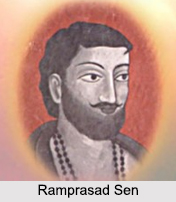 Ramprasad Sen was a singer of devotional songs, especially "shyamasangit" and was a spiritualist poet. His bhakti poems are known as Ramprasadi which are still popular in West Bengal. They are generally addressed to the Hindu goddess Kali and written in Bengali. The stories written by Ramprasad typically include legends and myths mixed judiciously with biographical details. It is said that he showed an inclination towards poetry from an early age. He is credited with creating a new compositional form that combined the Bengali folk style of Baul music with traditional melodies and kirtan.
Ramprasad Sen was a singer of devotional songs, especially "shyamasangit" and was a spiritualist poet. His bhakti poems are known as Ramprasadi which are still popular in West Bengal. They are generally addressed to the Hindu goddess Kali and written in Bengali. The stories written by Ramprasad typically include legends and myths mixed judiciously with biographical details. It is said that he showed an inclination towards poetry from an early age. He is credited with creating a new compositional form that combined the Bengali folk style of Baul music with traditional melodies and kirtan.
Early Life of Ramprasad Sen
Ramprasad Sen was born into a Baidya Tantric family in Halisahar in North Kolkata. He was born in Halisahar, a village on the banks of the Ganges around 1718 or 1723. It is alleged that, Ramprasad was born into a Tantric family. His father, Ramram Sen, was an Ayurvedic doctor and Sanskrit scholar. Ramprasad`s mother Siddheswari was Ramram`s second wife. Ramprasad was sent to a Sanskrit school where he learned Sanskrit grammar, literature, Persian and Hindi.
In his young age, he had an aptitude for poetry and learning new languages. As he grew up, his religious inclinations caused a great deal of nervousness to his parents. His parents married him to a girl named Sarvani when he was twenty two years old. Ramprasad later became the follower of Krishnananda Agamavagisha.
Works of Ramprasad Sen
After his father`s death, his family was passing through financial poverty. He set out for Kolkata to earn his livelihood at the age of 17 or 18. He obtained a clerkship at the court of a zamindar. He was always involved in thoughts of composing devotional music. Coming to know of the intelligence of Ramprasad, the zamindar sent him back to the village with a payment of 30 a month and advised him to spend his time on music.
Ramprasad then returned home and begun composing music and writing lyrics. He set his songs to music and sang those by himself. At that time, Krishnachandra Roy was the king of Nabadwip. Coming to know about Ramprasad`s talent, he invited him to his court. According to legends, Siraj-Ud-Daulah, on his way from Murshidabad to Kolkata, once heard Ramprasad singing by a river bank and called him into his boat to make him sing some more pieces. Ramprasad introduced a new way of worshipping through Shyamasangit or songs in praise of Goddess Kali. He created an exclusive form by fusing devotional songs, classical notes and "baul" tunes, which later came to be known as Ramprasadi tunes in Bangali music.
Ramprasad`s life was marked by specialized service as well as dedication to spiritual practice. A lot of of Ramprasad`s songs have been lost. Some famous notes by him are - "man re krsi kaj jano na", "dub dere man kali bale", "ma amay ghurabi kata"etc. These songs have been popular in Bengal forever. Like the Shyamasangit the Agamani songs, also form a significant contribution of Ramprasad Sen to Bangali music. The songs are based on the stories of the descent of Goddess Durga, along with her sons and daughters, from Kailasa into the earth to take offerings from mankind.
Death of Ramprasad Sen
The death of Ramprasad Sen is covered as unknown, which later gave birth to a folk story. It is believed that at the time of immersion of the goddess on the last day of kali puja, he jumped into the Ganges along with the goddess singing the song Tilek dandaore shaman.
Ramprasad Sen is one of the notable figures of the Bhakti movement in Bengal in the 18th century. He popularized the Bhakti Shakta tradition and Shyamasangit. His literary works include "Vidyasundar", "Kali-kirtana" and "Shaktigiti". "Kali-kirtana" is a compilation of lyrics and narrative poetry that describes the early life of Uma. "Vidyasundar" is written in a narrative style that tells the traditional love story of Vidya and Sundara. In Shaktigiti, he expresses his deepest feelings and love for Goddess Kali.



















